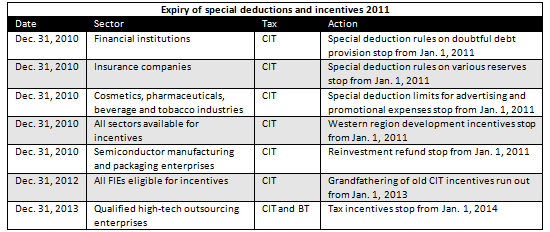China Phasing Out More FDI Tax Incentives
“Equal treatment” policy ignores practical differences between foreign invested and domestic enterprises
Op-Ed Commentary: Chris Devonshire-Ellis
Dec. 23 – China’s policy of phasing out tax incentives previously available to foreign investors reaches its end game in the next few days as some of the last remaining specialist incentives come to a close. Affecting everyone from financial institutions to cosmetics and semi-conductor manufacturers, the incentives reaching the end of the line are as follows:

Foreign investors have long enjoyed a variety of incentives, including the once very attractive five year tax breaks, but these are now long consigned to the scrap heap as China aims to put foreign investors on the same financial platform as its domestic companies. However, in some regards this makes it harder for foreign companies to compete. While legally foreign investors should be treated the same way as domestic corporations, in reality they are not. Foreign invested enterprises are considered as Chinese companies in law, however treatment of them in administrative areas often leaves them at a decided disadvantage when compared with Chinese owned domestic businesses. These include:
- Financial assistance during the economic downturn only being made available to Chinese owned businesses;
- Cheap loans and financing not being offered to foreign invested enterprises;
- Raising money via IPOs being restricted to Chinese owned entities;
- An additional 10 percent dividends tax being required to repatriate profits overseas;
- Obscure licensing requirements effectively barring foreign invested enterprises from tenders and contract bids;
- Leniency towards Chinese owned businesses in matters of labor disputes and the payment of mandatory welfare;
- Lax financial controls and personal arrangements affecting audit and income tax payments
The phasing out of the last tax incentives in China signals the end of an investment era, and especially the future of labor intensive, export based production. Just as once “Made in Hong Kong” was to be found stamped on the bottom of plastic toys, the “Made in China” label will move towards more added value appliances and products. “Made in India” and “Made in Vietnam” will begin to take over the low-end segment of the manufacturing industry. China meanwhile will be both moving up the added value chain and seeking to expand its own consumer base. This means that the new opportunities lie in selling to the Chinese consumer market. However, in doing so, foreign investors will come under far more competitive stress than before in battling for market share with Chinese owned businesses. Here, the playing field is decidedly not level.
The discrepancies between foreign invested and domestic owned companies will change, at least in part. China does intend to reform its listing requirements for IPOs in Shanghai and Shenzhen and is working to allow foreign enterprises a mechanism to raise money in RMB to fund China expansion. HSBC, for example, may list in Shanghai next year. The penetration of international banks into China will also permit greater access to domestic financing by foreign investors than has previously been the case. However, the more insidious aspects of business in China – the deliberate weighting of tender requirements to favor domestic owned businesses, and the ability to get away with lax interpretations of the law, will continue to grate. In some respects, business in China is often operated by local governments as mini fiefdoms, a situation that surely cannot be tolerable or wise in the longer term. Foreign investors will need to fight their corner in order to ensure they are not discriminated against.
While the end of an investment era draws to a close in China, the new era begins, and it is one that will require more patience, strength, and on-the-ground knowledge than ever before as an investment destination to succeed in. Foreign investors will need to be diligent in maximizing their financial effectiveness, and using all the tools at their disposal in order to grow. Business investments into China will need to be far more corporate minded than before, and companies setting up in the country more inquisitive about the right way to structure and financially manage their business than was the case in the past. If not, those weaknesses will work against China invested enterprises over the longer term. The new era requires more professionalism within foreign investors and the services firms that advise them. This year-end is a good time to take stock as concerns internal operations and the level of support being provided to your business. The new era will demand a higher level of professional competence and acquiring it will prove key to growth. With annual audits in China shortly to be due, now is a good time to evaluate your business in conjunction with the audit process to assess if it can match up to these new demands.
Chris Devonshire-Ellis is the principal and founding partner of Dezan Shira & Associates. The practice has been operational in China since 1992 and provides legal administration, establishment and tax planning services, in addition to ongoing compliance and maintenance issues with customs, tax and labor law to investors in the China market. The firm has 10 China offices. Please visit firm’s web site, e-mail the firm for advice at legal@dezshira.com, or download the firm’s brochure here.
- Previous Article New Report Released Outlining China’s 2011 Development with India
- Next Article Complimentary Reports Available from China Briefing









